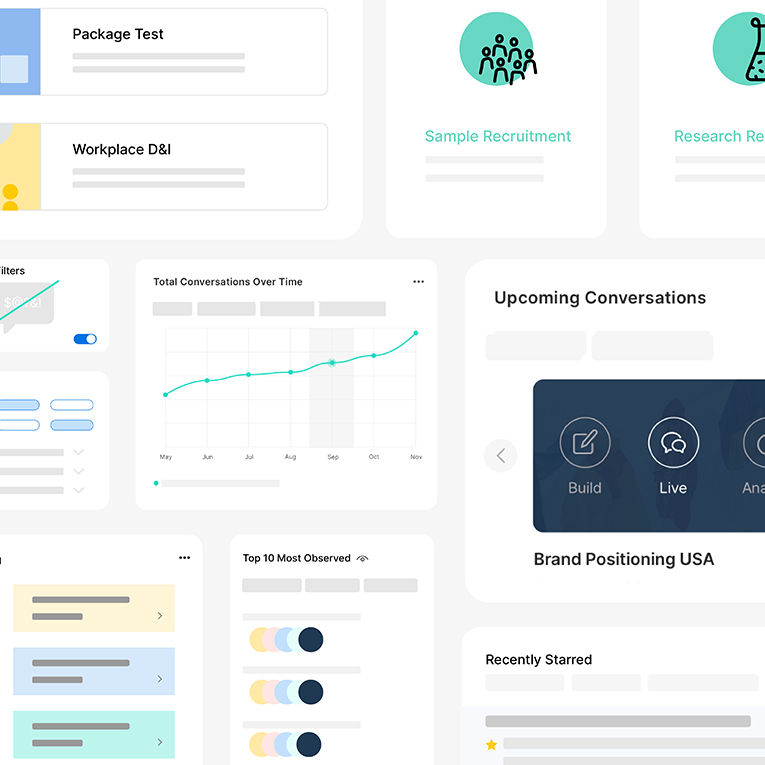.webp)
Trends
How to Calculate Your Sample Size Using a Sample Size Formula

.png)

.png)
Read More

.png)
.png)
.png)
Maria Noesi
November 25, 2021
.webp)
.webp)
.webp)
.webp)
.webp)
Employee Concerns About COVID-19 (Report)
In just a matter of weeks, life has changed dramatically. COVID-19 is forcing people around the world to live and work in radically different ways.

The following article was written by Anthony Caputo (Vice President of People Operations at Remesh) and Patrick Hyland (Director of Research and Development at Mercer | Sirota). To review their full findings from "Employee Concerns About COVID-19: Findings from the Field," download it here.
In just a matter of weeks, life has changed dramatically. COVID-19 is forcing people around the world to live and work in radically different ways. Shopping frenzies, barren shelves, shuttered restaurants, empty streets, whiplashing markets, rising case counts—this is the new reality for the near future.
For employees in many organizations, this is a time of great uncertainty. COVID-19 is changing the way people work, with travel bans, skeleton crews, remote work, and social distancing becoming the new norms. In many organizations, these new ways of working are raising questions and concerns.
To gain a better understanding of what employees are thinking about now, Remesh and Mercer|Sirota partnered together to conduct an online focus group in mid-March with a convenience sample of 256 employees working in small, medium, and large organizations. The research sample, which was drawn mostly from U.S. companies, included employees from different regions, job levels, and generations. Four main findings emerged.

9 out of 10 employees are concerned about COVID-19.
When participants were asked how worried they are that this virus could affect them or their families, 91% said they are at least moderately concerned. We also asked participants about how they think coronavirus will impact work. Remote work was one area of concern. Four out of ten respondents said they think this pandemic will lead to reduced cross-functional collaboration and a changing work culture. 36% of respondents said they are worried about how remote work will impact their work-life balance.

The financial impact of this pandemic was another area of concern. 37% of respondents said they are concerned about layoffs, 30% said they think this outbreak will lead to limited investments in training and development, and 24% are concerned the economic impact of COVID-19 could lead to reduced pay.

3 out of 4 employees think their organization is responding effectively to the pandemic.
When participants were asked to rate their organization’s response to the pandemic, 32% said it has been very effective and 45% said it has been effective. Just 4% said their organization’s response has been ineffective. Participants said that their leaders were helping employees cope with this pandemic by allowing people to work from home, providing strong and consistent communication, conducting regular check-ins, disseminating safety and wellness advice, suspending travel, and providing sick pay.

1/3 of employees think their manager’s response has been less than effective.
When participants were asked to rate their manager’s response to the pandemic, the majority (66%) said it has been very effective or effective. But 23% provided a neutral evaluation of their manager, and 10% said their manager’s response has been ineffective.

Many participants said their managers are taking the right steps to help their employees during this crisis. “Our manager has reinforced multiple times that even if you are not sick but don't feel comfortable coming to work it's ok to take time off or work from home. Very accommodating and supportive,” said one respondent.
But others felt their managers are unprepared and unavailable. “Our managers don't know how to deal with this,” said another respondent. “I have not had any discussions with my manager. He is unavailable for all concerns.”

Employees want support for their financial, physical, and psychological well-being during this health crisis.
When participants were asked how organizations could help employees during this pandemic, a number of themes emerged. The most popular theme focused on financial concerns: 72% of respondents said organizations should provide more reassurance that employees will not lose their jobs and will receive paid leave during the virus. Next, respondents said communication is critical: 68% said organizations should keep people informed with daily updates throughout the crisis. Additionally, safety and health are a critical concern, with 68% of respondents responding that their colleagues should stay home if they are sick. Finally, respondents said their organizations should be sure to provide emotional support (65%) and online mental health resources (55%) during the pandemic.
Considered together, results from this online focus group identified four immediate action steps that organizations should take to help their employees and address their concerns.
- Focus on the physical and mental health and wellbeing of your workforce. Allowing for remote work where possible, providing safety training and information, and setting clear guidelines around what employees should do if they get sick are all critical first steps. As a second step, ensure your employees are getting the mental health support they need to cope with the stresses (e.g., work-life balance, social isolation, anxiety) of the pandemic.
- Listen to your employees and ask about their concerns. If you haven’t asked your workforce how they are feeling, what their concerns are, and what kind of support they need during this pandemic, you are missing out on critical information. To find out what your workforce needs now, it is important to give your employees an opportunity to voice their questions and concerns. This can be done through team meetings, department-level discussions, virtual chats, or town halls. Various studies have found that social support increases our resilience and ability to cope. Listening to your employees is one effective way to make them feel supported and learn what they need.
- Communicate on a regular basis. During a crisis, information is critical. By providing your employees with a regular update on everything from the basics (e.g., safety procedures) to the big picture (e.g., how is our business faring), you can help your employees feel informed, empowered, and grounded. As you prepare your communications, be sure to keep your messages clear, transparent, and to the point.
- Help your immediate managers. Results from this study suggest that some managers may not know how to support their employees right now. Considering the magnitude of this crisis, that makes sense. Now is the time to ensure your immediate managers have the information, resources, skills, and support they need to help their direct reports get through what is—for many—a very anxious time.
Meeting the challenges of the day isn’t going to be easy. But, as we’ve said elsewhere, now is a defining moment for leaders—especially HR leaders—throughout the organization. The only way to support your employees while ensuring the long-term success of your organization is to balance deep empathy with economic realities. The four steps presented above can help you and your team strike that balance and guide your workforce through one of the most profound global challenges we have faced in decades.
To continue reading the Employee Concerns About COVID-19 (Report), download here.
More

Remesh Evolution: AI-Powered Insights Platform Unveils Major Updates to Satisfy Market Demand for High-Quality, Human-Centric Research

.png)

.png)
Read More

.png)
.png)
.png)

.png)

.png)
Learn More

.png)
.png)
.png)


Stay up-to date.
Stay ahead of the curve. Get it all. Or get what suits you. Our 101 material is great if you’re used to working with an agency. Are you a seasoned pro? Sign up to receive just our advanced materials.



